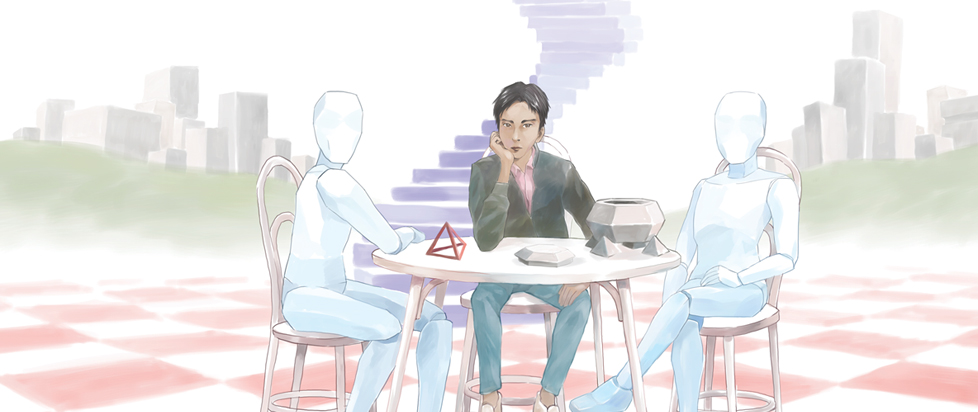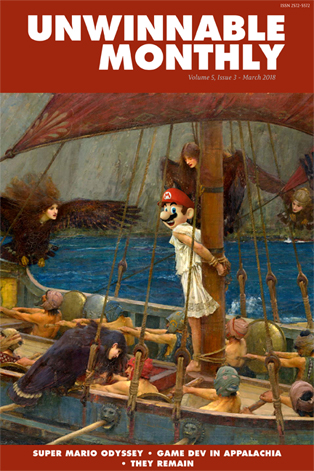
Surrounded by Strangers
 This column is a reprint from Unwinnable Monthly #101. If you like what you see, grab the magazine for less than ten dollars, or subscribe and get all future magazines for half price.
This column is a reprint from Unwinnable Monthly #101. If you like what you see, grab the magazine for less than ten dollars, or subscribe and get all future magazines for half price.
———
Finding deeper meaning beneath the virtual surface
———
Whenever I spend time with my mom in Tunisia, where she lives, family gatherings tend to go a certain way. We’ll be drinking tea at a sidewalk cafe, or sitting down at an aunt’s table for dinner, and the family will be chatting away in Arabic, while I sit mutely by, unable to communicate in a language I was never taught. My mom might charitably translate a few lines here and there, but she’ll soon tire of that labor and go back to the natural and free-flowing conversations that can only happen between native speakers in their shared tongue.
It is uniquely difficult coming to terms with your own identity when parts of your family, whether through language, distance or culture, feel like strangers. Sean Han Tani’s All Our Asia’s explores similar frustrations through its narrative. In the game you play as Yuito, an Asian-American hedge fund manager who participates in an experimental procedure allowing him to virtually explore his dying father’s memories bound within a misted low-poly world. His father, who left his mother before Yuito was born, is a stranger to him; and the final chance to plumb his memories is a tempting opportunity to witness parts of Yuito’s history that he had previously considered lost – to add pieces to his identity that he had previously assumed were unavailable.
But identity is a tricky mantle to wear in even the most clear-cut of situations. Yuito considers himself “Asian” and feels a closeness to others who fall under the same label without really understanding why. His journey through his father’s unstable memories shakes these foundations, however, and forces Yuito to more thoughtfully consider what it means to be part of a community, beyond simply recognizing a hazily shared common provenance.
Yuito begins the game on the phone with his mother, who warns him not to participate in the memory procedure, which sounds, admittedly, pretty dangerous. He dismisses her concerns, as a headstrong and heedless child inevitably must. We all have a natural inclination to reject the knowledge of our parents; we want to discover things in our own way and make our own mistakes. I have distinct memories of fighting with my mother as we traveled around Tunisia, prizing the instructions of my Lonely Planet guidebook above her imprecise street smarts. I selfishly wanted to rely on my knowledge, no matter its evident inauthenticity.
The journey into his father’s memory world doesn’t play out the way Yuito had imagined it would. Right off, he lands in a setting of impenetrable foreignness, a train station populated by people who only speak Japanese, a language Yuito wasn’t taught by his first and second-generation Japanese parents. He must stumble along as an accidental tourist, tripping over words, making gafs and faux-pas wherever he goes. Elsewhere the memories are fragmented snatches of his father’s childhood, too esoteric to be of any use to Yuito’s identity-building project.
[pullquote]Playing All Our Asias, I can’t help picturing how my own journey through my mother’s memories might go…[/pullquote]
It is only when Yuito is shuttled into a more concrete memory, a vision of the city of Chicago through his father’s eyes, that he begins to get a clearer picture of who his father was and what remains of his legacy. There, Yuito is guided by an entity named “General” who sends him on a frustrating series of chores that involve politically organizing for a group of struggling Asian restaurants in the city. In conducting these tasks, Yuito begins to see Chicago through his father’s point of view and interacts with people he ordinarily would have ignored in his own life with its own set of privileges.
Playing All Our Asias, I can’t help picturing how my own journey through my mother’s memories might go; how it might have been to experience New York in the 60’s, as an immigrant with only a few words of English at her disposal. I wonder how strange it might have felt, to use her non-black immigrant privilege to help her black roommate find housing in spite of the barriers erected by racist landlords in Queens (our current president’s forbearers).
A large part of identity can be found in the connections we make with others. The knowing nod I exchange with another black man spells one formation of this matrix. The long conversation with a Yemeni cab driver, who shares my first name, spells another. However, identity isn’t solely born from what is jointly remembered: it must also be reinforced by the actions we take in the present.
In All Our Asias these actions manifest in Yuito’s fight against the ceaseless machinery of gentrification, represented in-game as a group called “The Innovators.” Though his actions may be driven by a desire to know more about his father and by the vague kinship he shares with the Asian proprietors of the restaurants he’s trying to help, any successes Yuito achieves would inevitably help all marginalized people in Chicago, everyone left behind by the neoliberal, technocratic march of history – not just its Asian and immigrant population. Far from being a distraction to his goal, recognizing the common problems shared by all marginalized folks helps Yuito better understand his role as an Asian-American and as his father’s son.
Barriers will remain, of course. Language and culture conspire to divide us and leave us stranded like Yuito in his foreign dreamscape, using broken, fractured phrases to communicate with one another, but that’s only if we let them. I may never be able to confidently hold a conversation with my Tunisian aunts and uncles, but I am in regular contact with my cousins, who are much closer to my age. I see Tunisia’s struggle for liberation and self-determination through their eyes; I even see memes and pop-culture interpreted through their specific points of view. If I put the legwork in and reach out, my attention is reciprocated. It’s a far cry from feeling awkward and isolated at family gatherings.
The dangers of Yuito’s father’s Memory World are evident and ever-present. At its edges, an endless empty horizon threatens to encroach and erase the sparse structures and voices left behind by his father’s life. Pressing too hard for information, for easy answers, causes the ground to shake beneath Yuito’s feet and threatens to tear down the fragile walls of their joined psyches. After all, the process of self-discovery, of learning how you might fit into a legacy of immigrants and marginalized folks, is a painstaking and difficult one. It’s easy to rush forward without understanding, especially when those who might give you guidance are no longer present in your life. Despite all this, it’s as rewarding a process for Yuito as it has been for me. Finding new closeness with our families and our communities, and better understanding our place within them, gives us powerful new tools to resist the forces of doubt and isolation; both those which come from within and without.
———
Yussef Cole is a writer and visual artist from the Bronx, NY. His specialty is graphic design for television but he also enjoys thinking and writing about games.




